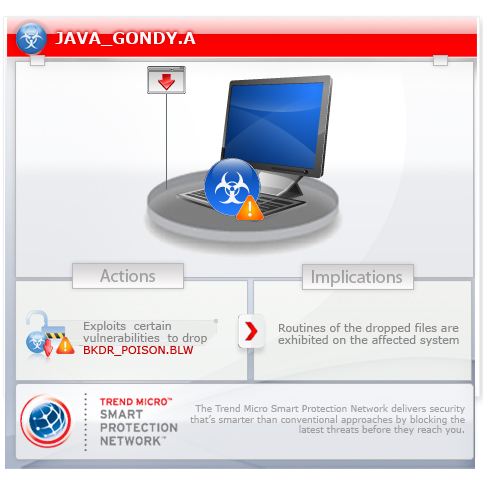JAVA_GONDY.A
Exploit:Java/CVE-2012-4681.O (Microsoft), Exploit.Java.CVE-2012-0507.pe (Kaspersky), Trojan.Maljava!gen24 (Symantec), Exploit.Java.CVE-2012-0507.AY (FSecure), EXP/2012-1723.ER.1 (Antivir), Java/Dong.A (Authentium), Exploit.Java.CVE-2012-0507.AY (Bitdefender), JAVA.Exploit.Agent-1 (Clamav), Java/Agent.NDE!exploit (Fortinet), Java/Dong.A (exact) (Fprot), Exploit.Java.CVE-2012 (Ikarus), a variant of Java/Exploit.CVE-2012-4681.A trojan (NOD32)
Windows 2000, Windows XP, Windows Server 2003


Threat Type: Trojan
Destructiveness: No
Encrypted:
In the wild: Yes
OVERVIEW
Downloaded from the Internet
This Trojan is a part of a Java applet that exploits a Java Runtime Environment (JRE) vulnerability. It uses an HTML file to download and execute a backdoor.
To get a one-glance comprehensive view of the behavior of this Trojan, refer to the Threat Diagram shown below.

This Trojan is a part of a Java applet that exploits a Java Runtime Environment (JRE) vulnerability. It checks if the system is running on Windows OS and uses the component HTML file detected as JS_FIEROPS.A to download and execute a backdoor detected as BKDR_POISON.BLW. The malicious Java applet then deletes the binary once executed.
This Trojan may be downloaded by other malware/grayware from remote sites.
It executes the downloaded files. As a result, malicious routines of the downloaded files are exhibited on the affected system.
It executes certain actions WITHIN the affected computer.
TECHNICAL DETAILS
3,946 bytes
JAR, Java Class
27 Aug 2012
Downloads files
Arrival Details
This Trojan may be downloaded by the following malware/grayware from remote sites:
- JS_FIEROPS.A
It may be downloaded from the following remote sites:
- http://ok.{BLOCKED}4.net/meeting/applet.jar
- http://{BLOCKED}.{BLOCKED}.104.149/public/meeting/applet.jar
Download Routine
This Trojan takes advantage of the following software vulnerabilities to download possibly malicious files:
It then executes the downloaded files. As a result, malicious routines of the downloaded files are exhibited on the affected system.
Other Details
This Trojan executes the following:
- Disable security features
- Download and execute binary components
- Check the target's operating system
NOTES:
This Trojan is a part of a Java applet that exploits a Java Runtime Environment (JRE) vulnerability. It checks if the system is running on Windows OS and uses the component HTML file detected as JS_FIEROPS.A to download and execute a file saved as %User Temp%\update.exe. This file is detected as BKDR_POISON.BLW. The malicious Java applet then deletes the binary once executed.
(Note: %User Temp% is the current user's Temp folder, which is usually C:\Documents and Settings\{user name}\Local Settings\Temp on Windows 2000, XP, and Server 2003.. %Temp% is the Windows Temporary folder, which is usually C:\Windows\Temp or C:\WINNT\Temp.)
SOLUTION
9.200
9.352.01
27 Aug 2012
9.353.00
28 Aug 2012
Step 1
For Windows XP and Windows Server 2003 users, before doing any scans, please make sure you disable System Restore to allow full scanning of your computer.
Step 2
Remove the malware/grayware file that dropped/downloaded JAVA_GONDY.A
Step 3
Scan your computer with your Trend Micro product to delete files detected as JAVA_GONDY.A. If the detected files have already been cleaned, deleted, or quarantined by your Trend Micro product, no further step is required. You may opt to simply delete the quarantined files. Please check this Knowledge Base page for more information.
Step 4
Download and apply this security patch Refrain from using these products until the appropriate patches have been installed. Trend Micro advises users to download critical patches upon release by vendors.
Did this description help? Tell us how we did.

